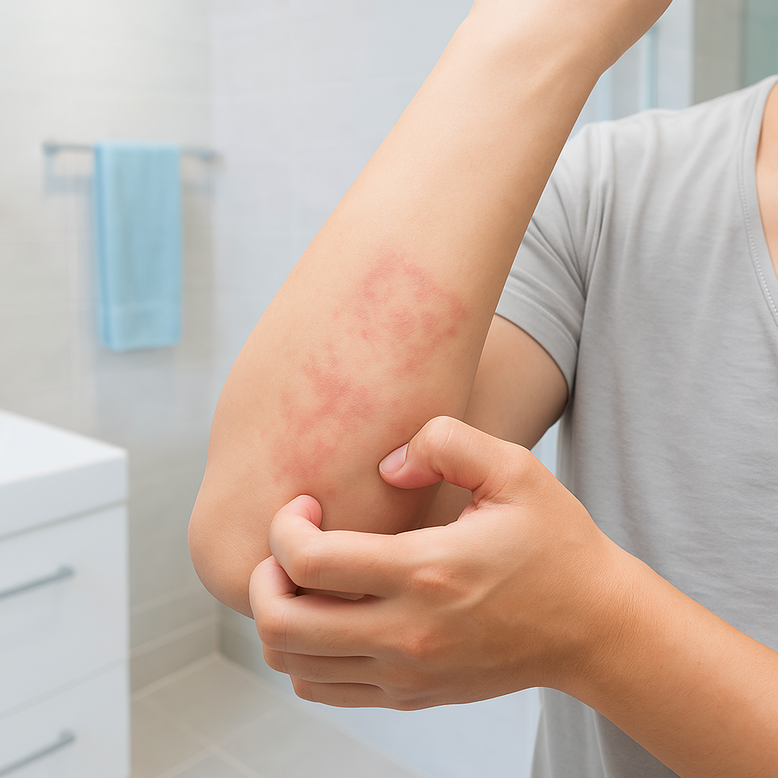Eczema, Dermatitis & Psoriasis
Skin & Dermatology
At SwiftMedi, we understand how conditions like eczema, dermatitis, and psoriasis can affect not just your skin, but also your confidence and daily comfort. Itching, redness, and flare-ups can be difficult to manage - but with the right treatment, symptoms can be calmed, irritation eased, and skin health restored.

About Eczema, Dermatitis & Psoriasis
Overview
Eczema, dermatitis, and psoriasis are some of the most common skin conditions in the UK, affecting millions of people every year. While each condition has different causes, they share one thing in common: the itching, irritation, and visible flare-ups can be exhausting — both physically and emotionally.
Living with these conditions often means more than just dealing with red or flaky skin. It can affect your sleep, self-confidence, and even day-to-day activities. Many people also feel embarrassed or misunderstood, especially since flare-ups can appear suddenly and last for weeks.
The good news? Effective treatments are available to calm irritation, soothe the skin, and prevent flare-ups from taking over your life. At SwiftMedi, our UK-registered prescribers can recommend safe and proven options through a secure online consultation, giving you fast, discreet access to the care you need.
Symptoms
Eczema & Dermatitis
- Itchy, dry, cracked skin
- Redness and inflammation
- Patches that may ooze or crust over (in severe cases)
- Worsening during cold weather or after triggers (like soaps or detergents)
Psoriasis
- Thickened, raised patches of red skin with silvery-white scales
- Itchiness or burning sensations
- Commonly appears on elbows, knees, scalp, and lower back
- Can flare up in cycles (clear skin followed by sudden patches)
Diagnosis
Eczema and dermatitis are usually diagnosed based on symptoms and a clinical history of flare-ups or triggers. Psoriasis is typically identified by its distinct scaly plaques and may require GP or dermatology confirmation. No formal tests are usually needed, but ruling out other skin conditions may sometimes be required.
Treatments
Lifestyle & Self-Care
- Use fragrance-free moisturisers and emollients daily
- Avoid hot showers and harsh soaps
- Identify and minimise triggers (stress, certain fabrics, chemicals)
Medical Treatments
At SwiftMedi, we can provide access to effective prescription and pharmacy medicines, including:
- Topical corticosteroids (e.g., hydrocortisone, betamethasone) to reduce inflammation
- Calcineurin inhibitors for eczema that doesn’t respond to steroids
- Coal tar or vitamin D creams for psoriasis
- Antihistamines to relieve itch
- Medicated shampoos for scalp psoriasis
Treatment suitability will always be assessed by a UK-registered prescriber following a secure online consultation.
Prevention
- Keep skin moisturised to maintain the skin barrier
- Manage stress, which often triggers flare-ups
- Wear breathable fabrics like cotton instead of wool
- Avoid scratching, which can worsen irritation and cause infections
Misconceptions
“Eczema and psoriasis are contagious.”
False — neither condition can be passed from person to person.
“Only children get eczema.”
While eczema is common in children, many adults live with it too.
“You can cure psoriasis completely.”
Psoriasis is a long-term condition, but treatment can control it effectively.
FAQ
Are eczema, dermatitis, and psoriasis the same thing?
Not exactly. Eczema and dermatitis describe inflamed, itchy skin, often triggered by irritants or allergies. Psoriasis is an autoimmune condition that speeds up skin cell turnover, causing scaly patches.
Can these conditions be cured?
No cure exists, but treatments can keep symptoms under control and prevent flare-ups.
What treatments work best?
This depends on the severity and triggers. Steroid creams, moisturisers, coal tar, vitamin D creams, and antihistamines are commonly used.
Do I need to see a dermatologist?
Most mild-to-moderate cases can be managed by GPs or online prescribers. Severe or resistant cases may need specialist referral.
Can stress make eczema or psoriasis worse?
Yes — stress is a well-known trigger for flare-ups. Managing stress can help reduce flare frequency.